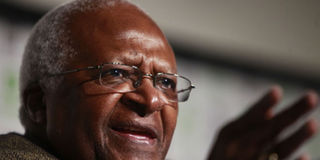Kiplagat faces MPs as Tutu backs quit calls

Archbishop Desmond Tutu of South Africa on Thursday led 10 former heads of truth commissions across the world in asking Mr Kiplagat to resign. Photo/REUTERS
Mr Bethuel Kiplagat’s fate as chair of the truth commission hangs in the balance on Friday as he meets Parliament’s committee on justice and legal affairs.
The meeting, scheduled for 10 o’clock at County Hall, comes amid increasing pressure for Mr Kiplagat to quit because of his alleged links to injustices during the Kanu regime.
On Thursday, Archbishop Desmond Tutu, of South Africa, led 10 former heads of truth commissions across the world in asking Mr Kiplagat to resign.
Conflict of interest
“We are deeply troubled by serious allegations of bias and misconduct that have been made against chairperson Kiplagat. The allegations about his role in the former Moi government have generated a widely held perception that he labours under an unavoidable conflict of interest and that he is unable to bring an impartial mind to bear on his important duties as TJRC chairperson,” Archbishop Tutu’s group said in a statement.
Mr Kiplagat, they said, was unsuitable to head the Truth, Justice and Reconciliation Commission because of his service in a government accused of injustices. The retired South African Anglican Church archbishop cited two reports of inquiry which adversely mentioned Mr Kiplagat.
The reports are the Commission of Inquiry into Illegal and Irregular Allocation of Public Land, also known as the Ndung’u report, released in 2004 and that of the Parliamentary Select Committee of Inquiry into the murder of former Foreign Affairs minister Robert Ouko.
The group noted that the Ndung’u report made references to Mr Kiplagat’s alleged acquisition of public land in a manner it claimed was irregular. The parliamentary committee, which was chaired by former Kisumu Town East MP Gor Sungu concluded that Mr Kiplagat was untruthful in his evidence.
Mounting pressure
The Tutu group includes Bishop Joseph Christian Humper, the former chairperson of the Truth and Reconciliation Commission for Sierra Leone and Mr Salomon Lerner Febres, former chairperson of the Peruvian Truth and Reconciliation Commission. Pressure has been mounting on Mr Kiplagat to resign, with lobby groups and former political prisoners questioning his suitability.
The groups, among them Centre for Multiparty Democracy (CMD), the International Centre for Policy and Conflict (ICPC) and the Release Political Prisoners (RPP), have been urging the government to act on complaints levelled against Mr Kiplagat and remove him from the position. They have also called on donors not to fund the commission unless Mr Kiplagat quits.
The commission needs at least Sh3 billion to do its work within the next two years, part of which will be donated by development partners. Already, the Kiplagat-led team has been allocated Sh100 million to be spent this financial year.
The commission was recently embarrassed when participants walked out of one of its meetings in Mombasa, demanding the resignation of Mr Kiplagat who has defended his mandate, saying he had what it takes to deliver since he had played a major role in brokering peace in Somalia, Sudan, Rwanda, Uganda and other countries for many years.
Perceived bias
Efforts to have him react to Thursday’s statement were futile as his phone went unanswered. Archbishop Tutu’s calls immediately drew support from the International Centre for Transitional Justice (ICTJ) which noted that Mr Kiplagat’s continued stay in office compromised TJRC’s integrity.
“If the TJRC is to be effective, it has to be free of any taint of real or perceived bias and impropriety,” said Suliman Baldo, Director of ICTJ’s Africa Programme. “To safeguard the commission’s work, we believe these international justice figures are exactly right in calling for the chairperson’s resignation.”
On their part, the 10 former heads and commissioners noted that “disturbing findings” had been made in the past against Mr Kiplagat on matters expected to come before TJRC.
“While Ambassador Kiplagat has disputed the references to him in these reports, they nonetheless have a direct and serious impact on public perceptions in relation to his fitness to hold high office in the Commission,” they noted.
“All truth commissioners must be seen to be upholding the highest standards of ethics and integrity. They need to be seen to be scrupulously independent and objective. We are constrained to point out that Ambassador Kiplagat does not meet these essential standards,” they added.
They warned that TJRC would fail in its mandate if it was not seen to enjoy the confidence of Kenyans. “Since objective grounds of a reasonable apprehension of bias on the part of Ambassador Kiplagat exist in the minds of the public, he is duty bound to resign for the greater good of the commission and country,” the commissioners observed.
Others who endorsed the statement are Alexander Lionel Boraine, the chairperson of the Mauritian Truth and Reconciliation Commission, former commissioners of the South African truth commission among them Dumisa Ntsebeza, Yasmin Sooka, Bongani Blessing Finca, Mary Burton, Richard Lyster and Fazel Randera.




